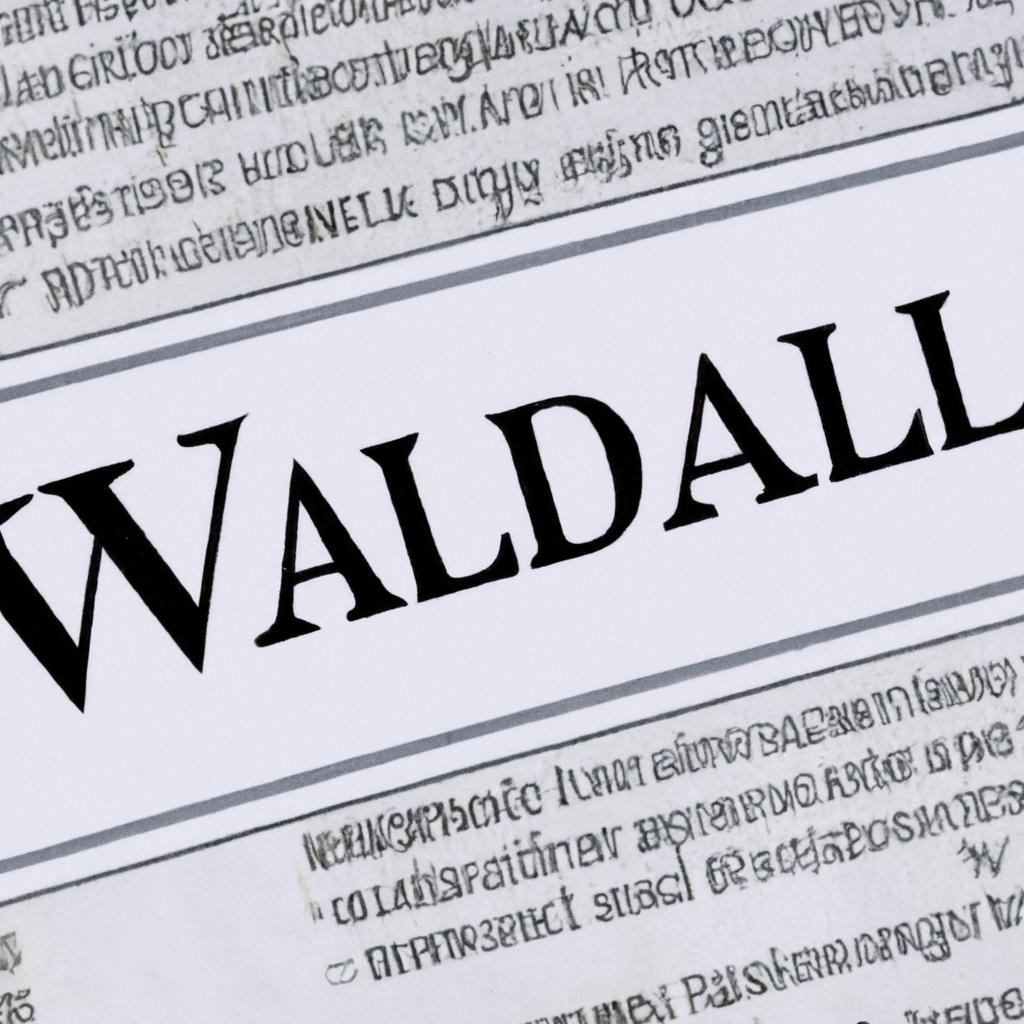As legal practitioners navigating the complex landscape of estate planning and probate laws, one question that often arises is whether one must physically be present for the reading of a will. The notion of a dramatic unveiling of a deceased individual’s final wishes may evoke images of grandeur and intrigue, but in reality, the process is far more practical and straightforward. In the realm of Wills and trusts, our team at Morgan Legal Group in New York City aims to demystify this common misconception and provide clarity on the nuances of estate administration. Join us as we delve into the intricacies of this important legal procedure.
Understanding the Legal Requirements for Will Reading
When it comes to the reading of a will, many people wonder if they are required to be present during the process. In most cases, the answer is no. The reading of a will is not a mandatory legal requirement, and it is typically done in private by the executor of the will or the attorney representing the estate.
However, there are a few things to keep in mind regarding the reading of a will:
- **Not all wills are read out loud:** Some wills are not read out loud, and beneficiaries are simply notified of their inheritance through other means.
- **Legal procedures:** The executor of the will is required to follow certain legal procedures when handling the will and distributing assets to beneficiaries.
- **Inheritance disputes:** If there are any disputes over the will or its contents, it may be necessary for all involved parties to meet and discuss the matter.

Exploring the Role of Presence in the Reading of a Will
In the realm of estate planning, the reading of a will is a pivotal moment that often carries a sense of importance and finality. Many individuals may wonder whether they are required to be physically present during the reading of a will, or if it can be done in their absence. While the concept of a dramatic reading of a will in a dimly lit room surrounded by eager beneficiaries is more fiction than reality, the role of presence in the reading of a will can vary depending on the specific circumstances.
When it comes to the reading of a will, it is crucial to understand that there is no universal requirement for the testator or beneficiaries to be physically present during the process. However, being present during the reading of a will can provide clarity, ensure transparency, and offer an opportunity for questions or clarifications. Ultimately, whether or not one chooses to attend the reading of a will is a personal decision that should be made after careful consideration of the potential benefits and implications.

Factors to Consider When Deciding Whether to Attend the Reading of a Will
When deciding whether to attend the reading of a will, there are several important factors to consider:
- Relationship to the deceased: If you were close to the deceased or are named in the will, it may be important for you to attend the reading to ensure your interests are protected.
- Legal representation: It can be helpful to have legal representation present at the reading to ensure that the will is being interpreted correctly and that your rights are being upheld.
- Emotional readiness: Attending the reading of a will can be an emotional experience, so it’s important to consider whether you feel emotionally prepared to handle the process.
Ultimately, the decision of whether to attend the reading of a will is a personal one that should be made carefully and thoughtfully. Consulting with an experienced estate planning attorney can help you navigate this process and make the best decision for your individual circumstances.
| Pros | Cons |
| Ensure your interests are protected | Emotional experience |
| Legal representation can provide guidance | Potential conflicts with family members |

Recommendations for Navigating the Will Reading Process with Ease
When it comes to the reading of a will, many individuals wonder if they must be physically present during the process. While it may seem like a crucial step to witness the reading of a will, it is not a legal requirement in most cases. The executor of the will is typically responsible for carrying out the instructions outlined in the document, and they will ensure that all beneficiaries are informed of their entitlements.
However, for those who wish to attend the will reading for closure or peace of mind, it is recommended to communicate with the executor in advance. This way, you can coordinate a suitable time and location for the reading of the will. Additionally, if you have any concerns or questions regarding the contents of the will, it is advisable to seek legal advice to ensure that your rights are protected throughout the process.
Q&A
Q: Do you have to be present for the reading of a will?
A: Not necessarily. The reading of a will is a common misconception perpetuated by Hollywood. In reality, wills are typically not read out loud to family members or beneficiaries.
To Conclude
In conclusion, whether or not you have to be present for the reading of a will ultimately depends on the laws of the state in which the will is being probated. While there may be instances where it is beneficial to attend the reading, in most cases, the contents of the will are typically shared with beneficiaries after the probate process is complete. Regardless of whether you are present for the reading or not, it is important to consult with a legal professional to ensure that your rights and interests are protected during this process.
 When a person passes away, their assets and belongings need to be distributed among their loved ones and beneficiaries. This process is known as probate and is overseen by a court to ensure that the deceased’s wishes are carried out. One of the key documents involved in this process is a will. A will is a legal document that contains instructions for how a person’s assets will be distributed after their death. However, many people are unsure about whether they need to be present for the reading of a will. In this article, we will explore this question in detail and provide valuable information to help you understand the process of reading a will.
When a person passes away, their assets and belongings need to be distributed among their loved ones and beneficiaries. This process is known as probate and is overseen by a court to ensure that the deceased’s wishes are carried out. One of the key documents involved in this process is a will. A will is a legal document that contains instructions for how a person’s assets will be distributed after their death. However, many people are unsure about whether they need to be present for the reading of a will. In this article, we will explore this question in detail and provide valuable information to help you understand the process of reading a will.
Firstly, it is important to understand that the reading of a will is not a dramatic event as often portrayed in movies and TV shows. In reality, there is no formal “reading” of the will and it is not required for the beneficiaries or loved ones to be present during this process. The notion of a dramatic reading is a Hollywood creation rather than a legal requirement. Therefore, if you are unable to attend the reading of the will, it is not something to worry about.
The reading of a will typically takes place after the death of the person who made the will, also known as the testator. It is done by the executor, the person responsible for carrying out the deceased’s wishes as stated in the will. This process involves the executor presenting the will to the court for approval and then distributing the assets according to the instructions outlined in the will.
In cases where there is no will present, the assets will be distributed according to state laws, which may not align with the wishes of the deceased. Having a will in place ensures that your assets are distributed according to your wishes and can help avoid conflicts among loved ones.
Do You Need to Be Present for the Reading of a Will?
As mentioned earlier, you do not have to be present for the reading of a will. In fact, most people are not invited or informed about the reading. The reason for this is that the reading of a will takes place in a court or attorney’s office rather than a public setting. This helps to ensure privacy and confidentiality, as the contents of the will are not disclosed to anyone who is not directly involved in the process.
The executor of the will is responsible for contacting the beneficiaries listed in the will after the assets have been distributed. They will also provide a copy of the will to the beneficiaries if requested. Therefore, it is not necessary for you to be present during the reading, as you will receive a copy of the will and be informed about your inheritance after the process is complete.
The Importance of a Will
Having a will in place is essential for anyone who wishes to have control over how their assets will be distributed after their death. Without a will, your assets will be distributed according to state laws, which may not align with your wishes. This can lead to unnecessary conflicts and prolonged court battles among loved ones.
Having a will can also help to minimize the taxes your loved ones will have to pay on your assets. If you have minor children, a will is crucial in determining who will take care of them in case of your untimely death. A will also allows you to name guardians for any dependents, such as elderly parents or disabled relatives, who are unable to care for themselves.
The Process of Creating a Will
Creating a will is a relatively simple process that involves determining your assets, naming beneficiaries, and outlining how you want your assets to be distributed. You can either create a will yourself, use a DIY will kit, or seek the help of an attorney. It is advisable to consult an attorney, as they can ensure that your will is legally binding and meets all the necessary requirements.
In most cases, it is also recommended to have witnesses sign your will to make it legally valid. These witnesses can also attend the reading of the will if you wish. However, their presence is not required, and they do not have any role in the distribution of your assets.
In Conclusion
In summary, you do not have to be present for the reading of a will. The process is carried out by the executor, and the beneficiaries are informed about their inheritance after the assets have been distributed. The most important aspect of a will is having one in place to ensure that your assets are distributed according to your wishes and to avoid conflicts among loved ones. Seek the help of an attorney to create a legally binding will and ensure that your assets are distributed as per your wishes.


